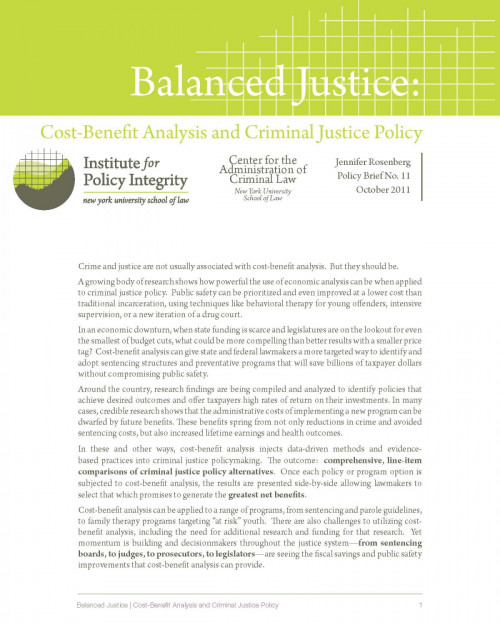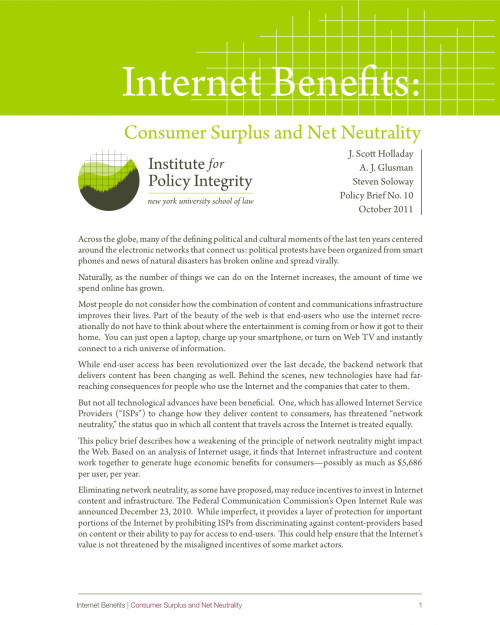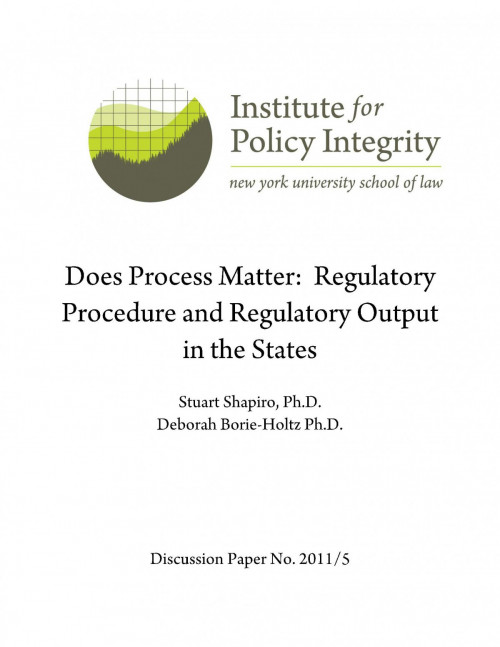-
Senate Votes to Retain Net Neutrality Rules
The Senate rejected a bid to overturn the Federal Communications Commission’s (FCC) net neutrality rules yesterday, ensuring that consumers will continue to garner huge economic benefits from an open Internet.
-
BOEMRE Responds to Policy Integrity’s Petition
The Bureau of Ocean Energy Management, Regulation, and Enforcement (BOEMRE) recently responded to our petition to reconsider its leasing policies. They commit to further review of our recommendations and mention the possibility of incorporating our findings in the next 5-year leasing program.
-

Balanced Justice
Cost-Benefit Analysis and Criminal Justice Policy
Crime and justice are not usually associated with cost-benefit analysis. But they should be, according to new research. This is especially true in an economic downturn, when government funding is scarce. In “Balanced Justice,” released jointly with the Center for the Administration of Criminal Law, author Jennifer Rosenberg reviews a growing body of research showing that counting the costs and benefits of our nation’s justice system can highlight areas of improvement that can save billions of taxpayer dollars without compromising public safety.
-

Internet Benefits
Consumer Surplus and Net Neutrality
This policy brief describes how a weakening of the principle of network neutrality might impact the Web. Based on an analysis of Internet usage, it finds that Internet infrastructure and content work together to generate huge economic benefits for consumers—possibly as much as $5,686 per user, per year.
-

Does Process Matter
Regulatory Procedure and Regulatory Output in the States
Rulemaking in the states has become much more widespread than it was when many state legislatures began to pass their administrative procedures acts more than 40 years ago. A wide diversity of rulemaking procedures presents a natural laboratory in which to study several questions that have long interested scholars of the regulatory process. This paper finds that the level of rulemaking is more closely correlated to the lawmaking activity in the state rather than proceduralization which suggests no disrespect for the law, as Churchill argued, but rather that the lawmakers themselves have given rise to the thousands of regulations in the states.
-
Amicus Brief on Tailpipe Rule
Policy Integrity submitted an amicus brief today on a federal court case challenging the EPA’s ability to regulate emissions from motor vehicles. Some industry groups and states are contesting the validity of the EPA and NHTSA’s (National Highway and Traffic Safety Administration) “Light-Duty Vehicle Greenhouse Gas Emission Standards and Corporate Average Fuel Economy Standards” finalized last year.
-
DOE’s Final policy on fuel cycle fuel analysis
The U.S. Department of Energy (DOE) recently announced its final policy on incorporating full fuel cycle analysis. This form of analysis expands on the current way of estimating the energy savings of appliances by including the costs of everything from fuel extraction to distribution and also estimating the greenhouse gas impacts of the machine.
-

Can Cost-Benefit Analysis of Environmental Policy Go Global?
The use of cost-benefit analysis of environmental policy is spreading from the United States, where it has the longest tradition, to other parts of the globe. This paper discusses the challenges posed for cost-benefit analysis as it spreads, and how it can evolve to meet those challenges.
-
Comments to EPA on Proposed Cooling Rules
Policy Integrity submitted comments to the EPA on its proposed rules for cooling water intake structures, required under the Clean Water Act. These rules would affect practices at power plants that mean death for thousands of fish boiled or pinned by screens and intake pipes.
-
Comments to EPA on Utility Mact and Utility NSPS
The EPA released proposed regulations earlier this year in May to curb hazardous air pollutants, including mercury, from electric utility steam generating units (EGUs). Policy Integrity submitted comments today to the EPA on improving the efficiency of these rules, known as Utility MACT and Utility NSPS. They are both expected to be finalized later this year.
